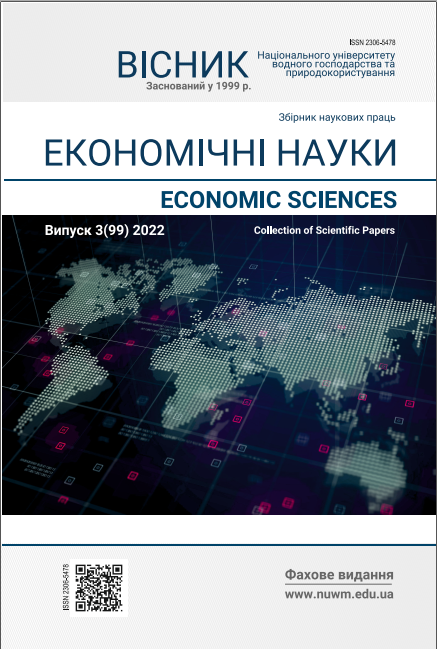JOINT MANAGEMENT OF WATER AND LAND RESOURCES AS A WAY OF ENSURING THE ENVIRONMENTAL AND ECONOMIC SECURITY OF AGRICULTURAL NATURAL USE
DOI:
https://doi.org/10.31713/ve3202219Keywords:
management, water resources, land resources, nature resources management, security, innovation, efficiency.Abstract
The article proves that water and land resources are used inefficiently, which leads to a violation of the ecological sustainability of natural systems and the economic efficiency of agricultural landscapes. It is substantiated that the improvement of ecological and economic security in land and water resources will lead to systemic and synergistic effects of the balanced functioning of industries for strategic state and regional interests. The article emphasizes that institutions dealing with land and water resources do not have time to respond to the growing intensity of economic use of river basins, the growing relationship between land and water resources, and the growth of competition for their use. That is why more adaptive and flexible mechanisms are needed, which will allow solving the problems of lack of natural resources and preservation of market potential more effectively. The author proposed an original approach to the joint management of water and land resources, which includes a systematic assessment of the potential of land and water resources, as well as an analysis of alternatives for their optimal use and improvement of economic and social conditions based on the process of participation of all interested parties. It has been established that planning is one of the most important components of joint management, which includes the assessment of water and land resources, thedetermination of the needs and tasks of their use, the selection and implementation of optimal options for sustainable resource managementtechnologies at various levels (for individual enterprises, regions or at the national level) as well as monitoring and assessing consequences forinforming decision-makers. It has been proved that effective and inclusive management, as well as coordinated and integrated policy measures in various sectors of the economy, are necessary to create effective mechanisms for the joint management of water and land resources.References
Стратегія розвитку водної політики України – Водна Стратегія. URL:
https://mepr.gov.ua/files/KMU_Water%20Strategy_new.pdf (дата звернення: 20.09.2022).
The state of the world’s land and water resources for food and agriculture 2021: main report. Food and Agriculture Organization of the United Nations. Rome. 2022. 363 p.
Mo Li, Qiang Fu, Vijay P. Singh, Dong Liu, Tianxiao Li, Yan Zhou. Managing agricultural water and land resources with tradeoff between economic, environmental, and social considerations: A multi-objective non-linear optimization model under uncertainty. Agricultural Systems. 2020. Vol. 178.
Qian Tan, Shan Zhang. Optimal Use of Agricultural Water and Land Resources through Reconfiguring Crop Planting Structure under Socioeconomic and Ecological Objectives. Water. 2017. Vol. 9(7). 488 р. URL: https://www.researchgate.net/publication/318213887_Optimal_Use_of_Agricultural_Water_and_Land_Resources_through_Reconfiguring_Crop_Planting_Structure_under_Socioeconomic_and_Ecological_Objectives (дата звернення: 28.08.2022).
Xue X., Liao J., Hsing Y. T., Huang C. H., Liu F. M. Policies, land use, and water resource management in an arid oasis ecosystem. Environmental Management. 2015. Vol. 55. Pp. 1036–1051.
Водные ресурсы. Глава 8. URL: https://www.unccd.int/sites/default/files/2018-06/GLO%20Russian_Ch8.pdf (дата звернення: 15.09.2022).
Bossio D., Geheb K., Critchley W. Managing water by managing land: Addressing land degradation to improve water productivity and rural livelihoods. Agricultural Water Management. 2010. Vol. 97. Pp. 536–542.

